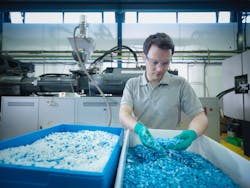Developing a Sustainability Program Focus
Toward the end of 2020, Automation World conducted a study of sustainability initiatives across industry to gauge the status of such efforts since we last conducted the study in 2016. One of the key findings of this project was that little had changed in the four years between the two studies.
As noted in the “Industrial Sustainability Focuses on Energy Management” feature article based on the research findings: In 2016, 59.3% of respondents said their companies have a sustainability program in effect. In 2020, 58.8% also answered yes. These responses are within the range of statistical error, meaning that the level of sustainability programs appears to have remained static since 2016.
During an interview for this article with Vikram Mankar, principal digital product manager for GE Digital, he agreed that the roughly 60% level of sustainability programs indicated by our survey response is a good approximation for the manufacturing industries as a whole. “We are seeing different levels of maturity and awareness around production-related sustainability across the different manufacturing verticals,” he said. “Consumer-oriented industries, like food and beverage and consumer packaged goods, are further ahead in sustainability programs, as compared to non-consumer and heavy-industry verticals.”
Given the relative stasis of industrial sustainability projects over the last few years, we connected with Subrat Tripathy, chief business officer at L&T Technology Services Ltd., to find out how the company views the current state of industrial sustainability. L&T Technology Services is an engineering services company that address multiple areas, from mechanical design and security to cloud-based product lifecycle management and asset management.
Tripathy also highlighted sustainability initiatives at several other industrial companies, with a focus on suppliers of automation technologies and related industry services:
- Rockwell Automation has declared its commitment to a carbon-neutral future through accelerating smart, safe, and sustainable manufacturing.
- Halliburton has announced science-based targets to reduce its emissions.
- ABB has announced various initiatives in the areas of e-mobility, electrification, and automation innovation, emphasizing its commitment towards a sustainable future.
- Total is set to use Honeywell UOP Technology to produce renewable jet fuel and diesel at its zero-crude platform in France.
- Baker Hughes is set to acquire Compact Carbon Capture to help advance industrial decarbonization.
- Schneider Electric has collaborated with various partners and launched several green initiatives such as Carbon Neutrality and Co-Development of Energy-Efficient Solutions with STMicroelectronics and a decarbonization program with Station A.
- Stanley Black & Decker is working on sustainable IoT connectivity with Ericsson and T-Mobile.
- Applied Materials has committed to 100% renewable energy sourcing worldwide.
- Emerson has announced its plans to modernize a TVA power plant for reliable clean energy and the Salto Grande hydroelectric power complex to ensure renewable energy supply in Latin America.
- Thermal Energy Partners and Schlumberger New Energy have entered into an agreement to create GeoFrame Energy, a geothermal project development company.
Another example announced recently involved Aspen Technology’s decision to join the Alliance to End Plastic Waste. According to AspenTech, the company will “work with fellow members to support innovation to build a more sustainable global plastic value chain. From industrial design to driving greater efficiency in operations, AspenTech solutions help producers reduce waste and emissions from plastic production and accelerate innovation to develop recycling plants and other new solutions for the circular economy.”
While taking note of the sustainability initiatives at large companies is inspiring and can help drive small to medium-sized manufacturers to move forward with their own initiatives, the problem for many smaller companies is knowing where to focus.
In the “Industrial Sustainability Focuses on Energy Management” feature article, GE Digital’s Mankar noted: “One of the biggest mistakes we have seen customers make is to start a sustainability initiative as part of a department initiative, typically environmental health and safety, which is separate from production. Often this ends up being disconnected from the actual production metrics and gets measured purely based on monthly utility savings. Then, when you just look at sustainability success as savings in utility bills, it does not seem like you have achieved much value for the effort you had to put in.”
To help ensure sustainability efforts have more tangible results, Tripathy suggested focusing on the following five areas:
Smart Products. “Embedding sensors and controls in products and solutions leads to major benefits, including enhanced customer experience,” noted Tripathy. “But at the same time, these smart products also serve a bigger cause of providing data insights to the manufacturer, thereby reducing the effort spent on incremental upgrades to the products,” he said. “It also leads to greater control and cost reduction.”
Renewable Energy. “Renewable energy and energy storage solutions are shaping the future of industries,” said Tripathy. “Greenfield and brownfield renewable plants can play a huge role in improving the sustainability quotient and has obvious benefits such as energy yield optimization and plant efficiency improvement.”
Electrification. After renewables, smart grids are the biggest contributors to the carbon neutral goal, according to Tripathy. “They contribute to reduced carbon emissions through improved uptime, transformer health monitoring, data analytics, and real time insight into utility operations leading to improved demand forecasting and utilization of assets,” he said.
Strategic Sourcing. “There is a huge potential for carbon reduction in supply chain management and especially in the area of strategic sourcing and can lead to ~15% reduction of logistic costs associated with imports,” he said.
Additive Manufacturing. Tripathy noted that additive manufacturing “thrives on its versatility, reduced energy consumption, and minimal waste generation. Subtractive processes, such as molding and forming, are prone to waste creation and also leave precious little that can be recycled or reused, whereas additive manufacturing uses only that amount of material required for production. This reduces waste and carbon footprint.”
About the Author
David Greenfield, editor in chief
Editor in Chief

Leaders relevant to this article:

